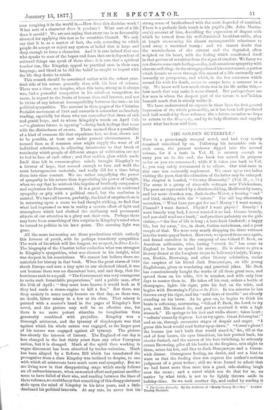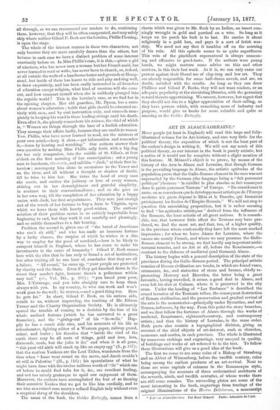THE GOLDEN BUTTERFLY.*
Tins is a provokingly unequal novel, and had very nearly remained unnoticed by us. Following his invariable rule in such cases, the present reviewer dipped into the second volume, for if a taste in Vol. II. is savoury enough to carry you on to the end, the book has served its purpose so far as you are concerned ; while if it takes you back to Vol. I., you may safely recommend it to others. Our trial-taste in this case was eminently unpleasant. We came upon two ladies visiting the poor, that the education of the latter may be enlarged. The chapter is headed, " Greater Humanity." (Vol. H., c. 14.) The scene is a group of river-side cottages near Twickenham. The poor are represented by a drunken old hag, Medlicott by name, and her more drunken son, Jack-in-the-'Pater, a boating " cad " and thief, shaking with the " 'orrors." The old hag alternately maunders, " What have you got for me ? Money ? I want money. Flannel? I want flannel. Physic ? I want physic? Brandy ? I want brandy very bad, I never wanted it so bad. Gimme brandy, and you shall read me a track," and practises palmistry on the girl- visitor,—" the line of life is long ; a love-knot hindered ; a happy life, but far away," &c., in short, fustian melodrama, and a poor sample of that. We were very nearly dropping the three volumes into the waste-paper basket. However, we opened them once again, and found ourselves in the company of one Gilead P. Beck, an American millionaire, who, having "struck ile," has come to England to learn to spend his money. Ile is about to give a literary dinner at the Langham to (as lie believes) Carlyle, Tenny- son, Ruskin, Browning, and other literary celebrities, under the auspices of his friend Jack Dunquerque, an idle young Englishman, given to wandering and practical jokes. Mr. Beck has conscientiously bought the works of all these great men, and spread them on his table, 300 in number, and with only four days to master them in. He takes off his coat, orders a bottle of champagne, lights his cigar, puts his feet on the table, and begins with Browning's Fijine at the Fair. In ten minutes he has thrown away his cigar, and the "cold dews of trouble" are already standing on his brow. As he goes on, lie begins to think his brain is softening, murmuring, " Gilead 1'. Beck, the Lord, to try you, sent His blessed ile, and you've received it with a high stomach." He springs to his feet and walks about; takes heart ; " softnin' comes by degrees. Let us try again. Great Jehosophat!" and so on, through successive stages of despair and anger. " I guess this book would read better upsy-down." "Caesar's ghost ! the human jaw isn't built that would stand it," &c., till at the end of four hours, his eyes bloodshot, his hair pushed back, his cheeks flushed, and the nerves of his face twitching, he solemnly curses Browning, piles all his books in the fireplace, sets alight to them, seizes his hat, and flies to Jack Dunquerque and a Green- wich dinner. Outrageous fooling, no doubt, and not a hint to warn us that the fooling does not express the author's serious judgment of a great writer ; still we were bound to admit that we had burst more than once into a good, side-shaking laugh over the scene ; and a novel which can do that for us, no matter by what trick, is not to be lightly thrown aside in holiday-time. So we took another dip, and ended by reading it • The Golden Butterfly. By the Authors of Beady-Money Mortiboy." London Tinsley Brothers. Even after it, she piously remembers his axioms, the chief of which
is, " Women see things through the haze of a foolish education.
They manage their affairs badly, because they are unable.to reason on the river, and all without a thought or shadow of doubt, out of the wreck of her fortune to buy a farm in Virginia, upon which we leave them with hearty good-wishes. The authors' question this astonishing proposition, but it is rather amusing solution of their problem seems to us entirely improbable from to find "lee aptitudes artistiques "derived from the influence of beginning to end, but they work it out carefully and pleasingly, the Romans, the least artistic of all great nations. It is remark- and so entitle themselves to a fair hearing.
Problem the second is, given one of " the breed of Americans duced, we find the most art, and that, too, of a higher quality, who can't sit still," and w ho has made an immense fortune
in the province where confessedly they have left the most marked by a lucky chance, the surplus of which he wishes in a dim impression ; for when we leave Alsace for Lorraine, where the names are mostly French, and where we may presume the Gallo- way to employ for the good of mankind,—how is he likely to comport himself in England, where he has come to make his investments in the cause of humanity ? Gilead P. Beck comes here with the idea that he has only to found a set of institutions, contrast to the richness of media but after visiting all he can hear of, concludes that they are all The history provinces during the Gallo-Roman period. The principal artistic a failure. " All round," he sums up, " your people are protected by charity and the State. Even if they get knocked down in the remains of Roman civilisation are tombs, in which are found vases, street they needn't fight, because there's a policeman within ornaments, &c., and statuettes of atone and bronze, chiefly re- easy hail" (sic, Vol. III., p. 266) ; "you breed your poor, presenting Mercury and Hercules, the latter being a great Mrs. L'Estrange, and you take almighty care to keep them favourite, having travelled, it seems, a good deal in Alsace, and always with you. In my country, he who can work and won't even left his club at Colmar, where it is preserved in the city arms. Under the heading of "Les Barbares " is described the work goes to the wall ; he starves,—and a good thing too. Here ri he gets fat." In short, Gilead P. Beck, on his serious side, armed invasion of the Teutonic tribes, the consequent destruction retails to us, without improving, the teaching of Mr. Ribton of Roman civilisation, and the preservation and gradual revival of Turner and the Charity Organisation Society. He is ultimately the arts in the monasteries—principally under Byzantine, and not spared the trouble of coming to a decision by the loss of his Roman, influence, by the way. From this point the story branches, whole realised fortune (which he has entrusted to a great and we first follow the fortunes of Alsace through the works of also, medieval, Renaissance, eighteenth-century, and contemporary financier), and the °' giving-out " of his " ile-wells." Hap-
pily he has a comic side so, and his accounts of his life asrtists ; and then the history of Lorraine, in the same order. schoolmaster, fighting editor of a Western paper, railway guard, Both parts also contain a topographical division, giving an miner, and loafer ; his theories that °'inside the rind of the account of the chief objects of art-interest, such as churches, sorts of things, gold and iron, lava,
earth there may be all museums, and castles, in each province. The whole is illustrated diamonds, coals, but the juice is ile;" and when it is all gone, by numerous etchings and engravings, very " this poor old airth will crack up like an empty egg" (I., p. 167) ; il that the restless Yankees are the Lost Tribes, wanderers from the these illustrations will give us a good idea of the book. time when " Isaac went round on the move, and Jacob couldn't The first we come to are some coins of a Bishop of Strasburg
sit still in Palestine" (II., p. 116) ; his speculations of what he ry might have done with the twelve millions worth of "ile" which ran being among the earliest products of an art-revival. Next to off before he could find tubs for it, &c., are excellent fooling, these are some capitals of columns in the Romanesque style,
our enjoyment of them. and not too utterly grotesque to spoil accompanying the accounts of three ecclesiastical architects of Moreover, the authors have accomplished the feat of so limning the seventh, ninth, and twelfth centuries, of whose works there their eccentric Yankee that we get to like him cordially, and to are still some remains. The succeeding plates are some of the see him as a ruined man marry a refined English lady without even most interesting in the book, engravings from tracings of the a sceptical shrug of the shoulders. original illuminations of the Hortus Deliciarum, a manuscript
The name of the book, the Golden Butterfly, comes from a * L'Art en Alsace-Lorraine. Par Bent Alinard. Paris: Librairie de ram all through, as we can recommend our readers to do, cautioning charm which was given to Mr. Beck by an Indian, an insect cun- them, however, that they will be often exasperated, and may safely ningly wrought in gold and perched on a wire. So long as it skip where neither Gilead P. Beck nor the heroine, Phillis Fleming, keeps on its perch his luck is to last. He carries it about is upon the stage.
religiously in a gold box, and pays it a sort of fetish wor-







































 Previous page
Previous page